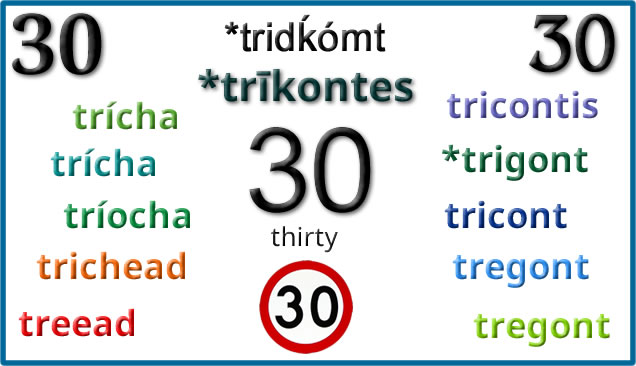Words for to be born, birth and related things in Celtic languages.
Words marked with a * are reconstructions.
| Proto-Celtic | *ganyetor = to be born |
|---|---|
| Old Irish (Goídelc) | gein = birth genemain = birth, generation gainithir = to be born, arise, beget, originate ad·gainethar = to be reborn, to restitute |
| Middle Irish (Gaoidhealg) | gein, gene = birth, genemain, geinemain = coming into existence, birth, generative power, growth, production, race, progeny, source, fountain-head gainithir, gentair, gēntar = to come to life, be born, produce, arise, originate, beget, procreate, conceive ad-gainethar, adgainethar = to be reborn, to restitute, make good |
| Irish (Gaeilge) | gin [ˈɟɪnʲ] = to give birth to, beget, procreate, generate, produce; begetting, birth, foetus, chid, offspring, person giniúint = procreation, conception, birth, reproduction, generation, embryo, progeny, breed giniúnach = generative gineadóir = begetter, sower, generator gineadóireacht = (act of) generating ginealach = genealogy, pedigree gineog = little offspring, baby (girl), little sprout, bud, germling |
| Scottish Gaelic (Gàidhlig) | gin [gʲin] = beget, father, create, engender, procreate, reproduce, breed, generate gineach [gʲinəx] = genetic gineachas [gʲinəxəs] = genesis gineadach [gʲinədəx] = creative gineadachadh = generating, generation gineadair [gʲinədɪrʲ] = progenitor, procreator, generator ginealach [gʲinəl̪ˠəx] = generation |
| Manx (Gaelg) | gientyn = to beget, conceive, evolve, generate, procreate, produce; begetting, conceiving, conception, gender, generation, production giennaghtyn = to beget, develop, generate, procreate; generation, developing, producing |
| Proto-Brythonic | *gėnjed = to be born |
| Middle Welsh (Kymraec) | ganed, geny, geni = to be born, give birth to, bring forth, beget, produce; birth ganedic, ganedig = born, begotten, native, natural, innate, native ganedigaeth = birth, offspring, procreation, origin, beginning, spiritual regeneration, the act of bringing forth genedigawl = native, innate, hereditary, natural, born, indigenous, natal |
| Welsh (Cymraeg) | geni [ˈɡɛnɪ/ˈɡeːni] = to be born, give birth to, bring forth, beget, produce; birth ganedig, genedig = born, begotten, native, natural, innate, native genedigaeth, ganedigaeth = birth, offspring, procreation, origin, beginning, spiritual regeneration, the act of bringing forth genedigaethol, ganedigaethol = native (language, etc), pertaining to (a person’s) birth genedigol, ganedigol = native, innate, hereditary, natural, born, indigenous, natal |
| Middle Cornish (Cernewec) | geny, genys, gynys = to be born |
| Cornish (Kernewek) | genys = born |
| Middle Breton (Brezonec) | ganet, guenell, guenel = to give birth (to), to bring/come into the world, to be born |
| Breton (Brezhoneg) | genel, ganañ, general [ˈɡẽː.nɛl] = to give birth (to), to bring/come into the world, to be born geneliezh = genesis genidigezh = natural gendik = native adcʼhenel [ad.ˈɣẽː.nɛl] = to be reborn |
Etymology: from Proto-Indo-European *ǵn̥h₁yétor, from *ǵenh₁- (to produce, beget, give birth) [source]. Words from the same PIE roots include: kind (child) and koning (king, monarch) (gender, sex) in Dutch, cognate, engine(er), gender, gene, general, genesis, genetic, genial, genius, gentle, kin, king, nature, oxygen and progeny in English, Kind (child, kid, offspring) and König (king) in German, nascere (to be born, bud, sprout) in Italian, and gentis (tribe, genus, family, kin) in Lithuanian [source].
| Proto-Celtic | *bereti = to carry *ɸarebereti = to use |
|---|---|
| Old Irish (Gaídelc) | beirid [ˈbʲerʲiðʲ] = to carry, bear, bring forth, judge ar·beir [arˈbʲerʲ] = to live, use, employ, eat, reproach, subdue, express |
| Middle Irish (Gaoidhealg) | beirid, berid = to carry, infer, bear, bring forth, be born, yield, produce, judge, pass judgement ar-beir, airbir = to live, eat, use, employ, plead, subdue, express |
| Irish (Gaeilge) | beir [bʲɛɾʲ] = to bear, give birth to; lay (eggs); bear away, win; bring, take; catch, overtake; proceed, advance |
| Scottish Gaelic (Gàidhlig) | beir [berʲ] = to take hold; bring forth, bear, produce; carry beirachd [berʲəxg] = bearing (children), giving birth, birthing, bringing forth, birth, nativity, taking hold, holding, catching up with |
| Manx (Gaelg) | behr = to bear (give birth to) ruggyr = birth, nativity laa ruggyr, laa ruggyree = birthday |
| Proto-Brythonic | *bėrɨd [be̝ˈrɨːd] = to flow, carry *ėrβėrɨd [be̝ˈrɨːd] = to make use of, employ, take |
| Middle Welsh (Kymraec) | beru = to flow |
| Welsh (Cymraeg) | beru = to flow, drip; drizzle arfer [ˈarvɛr] = to use, be used to, be accustomed to; custom, practice, procedure, habit |
| Middle Cornish (Cernewec) | berthy, perthy = to bear, carry, sustain, entertain, take porthy = to bear (with), carry, endure, sustain, suffer |
| Cornish (Kernewek) | perthi = to bear, endure, put up with, stand, suffer, tolerate perthyans = endurance, patience, tolerance |
| Middle Breton | beraff = to flow |
| Breton (Brezhoneg) | berañ [ˈbeːrã] = to drip, flow |
Etymology: from the Proto-Indo-European *bʰéreti (to be carrying), from *bʰer- (to bear, carry) [source]. Words from the same roots include: barn, barrow, (to) bear, birth, broad and (to) thole (to endure) in English, bie (to bring, deliver) Albanian, բերել (berel – to bring, fetch) Armenian, and berti (to throw, strew, scatter, shed) Lithuanian [source].
Sources: Wiktionary, Etymological Dictionary Of Proto Celtic, In Dúil Bélrai English – Old Irish glossary, eDIL – Electronic Dictionary of the Irish Language, Teanglann.ie, Am Faclair Beag, An etymological dictionary of the Gaelic language, Fockleyreen: Manx – English Dictionary, Online Manx Dictionary, Gaelg Corpus, Geiriadur Prifysgol Cymru, Lexicon cornu-britannicum : a dictionary of the ancient Celtic language of Cornwall, Gerlyver Kernewek, Devri : Le dictionaire diachronique du breton, Dictionnaires bilingues de Francis Favereau / Edition Skol Vreizh, TermOfis











